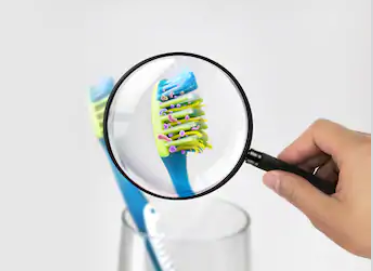Dr. Lin says the next time you reach for your toothbrush each morning, you may not realize what’s hanging out on its bristles.
Most of us just rinse our toothbrush head after we are done brushing. But a thorough rinse under warm water will help remove leftover food debris and toothpaste that remain on your bristles.
Even some healthy microorganisms found on your toothbrush can cause infections. These microorganisms can enter your gum tissue due to an injury, a break, or an oral ulcer.
Your toothbrushes is not required to be in sterile packaging. Those packaging may have some bacteria even though the packaging looks clean.
Let’s Keep It Clean
While there is no clinical evidence that soaking a toothbrush in mouthwash has a good effect, it will not hurt or damage the toothbrush. If you would like to sanitize your toothbrush, your toothbrush heads should be fully immersed for at least 15 minutes in antibacterial mouthwash. Any longer could possibly damage the bristles. You should never reuse or share the mouthwash you used to clean your toothbrush, this would defeat the purpose.
Wash it. Smiles of Round Lake Dentist suggest you give your toothbrush a warm tap water to remove debris. Remember if you have a systemic illness or immune disorder, please soak it in an antibacterial mouthwash or run it through the dishwasher.
Try deep cleaning. We see many types of toothbrush sanitizers you can purchase on the market, Dr. Lin says. Some of them you can find use ultraviolet light that kills microorganisms.
Store it properly. Smiles of Round Lake Dentist mentions that it is very important to store your toothbrush properly. After you brush your teeth, do not throw it wet into your medicine cabinet, drawer, or bathroom cup and forget about it. Bacteria like to grow in dark damp places.
Dr. Lin suggests you should store it upright, on a rack or in a cup, where it can air dry better. Remember the lack of air helps foster bacteria.
Is Your Toilet the Culprit.
We mostly brush our teeth in the bathroom, this very room your toilet is possibly located. This is an easy place to remember to brush your teeth, but it’s not ideal, especially when it comes to the storage of your toothbrush.
Statistics show that 60% of toothbrushes were found to contain fecal particles — 80% of which come from other people using the bathroom.
Finding another location is not always ideal. Dr. Lin suggests you store your toothbrush at least six to eight feet away from the toilet if at all possible. Remember when you are done doing your business, please put the lid down before you flush. Yes, toilet water sprays when you flush, and yes, that water contains germs.
No Sharing
You may sometimes get tempted to lend a toothbrush to a family member or friend? Here at Smiles of Round Lake Dentist we say “Don’t”.
When you share your Toothbrush, you transfer saliva and bacteria — even the bad kind that can cause tooth decay. “ Tooth decay is the destruction of your tooth enamel, the hard, outer layer of your teeth.” This should be one more reason not to share your toothbrush.
Is This Toothbrush Old
When should I call it quits on that old toothbrush?
When to call it quits. The American Dental Association recommends you swap out that old toothbrush for new one ever every 3 to 4 months, or when the bristles start to show signs of wear.
Keywords – Round Lake Dentist , Bacteria on toothbrush, Local Dentist

